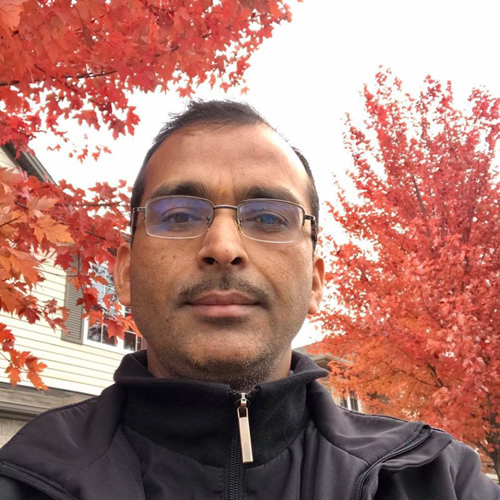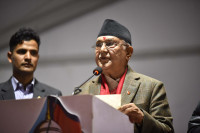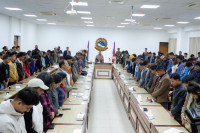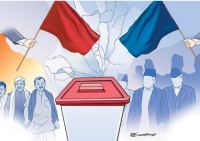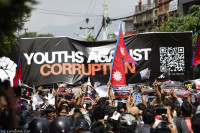Opinion
Dead and denied
Nanda Prasad Adhikari’s dead body at the Teaching Hospital still awaits justice
Bhanu Bhakta Acharya
The late Nanda Prasad Adhikari’s body has been lying for six months in the mortuary of the Tribhuvan University Teaching Hospital (TUTH) in Kathmandu. Still the so-called ‘democratic’ government of Nepal, which has a two-thirds majority, has not dared to settle the dead body of a justice warrior due to political interests. This is a matter of great shame for Nepal, as the late Adhikari’s body is witnessing politicalised injustice and is still awaiting justice, posthumously.
The incident
Nanda Prasad Adhikari died on September 22, 2014 while he and his wife Ganga Maya were on an indefinite hunger strike for 329 days, demanding justice for the murder of their 18-year old son, Krishna Prasad Adhikari. Then CPN (Maoist) cadres had allegedly murdered Krishna at Ratnanagar, Chitwan in June 2004, accusing him of working as an informant for the security forces during the war.
Amidst the fear of further consequences, the first information report (FIR) of this case was filed on December 11, 2005. But the then government decided not to proceed with conflict-era cases. In 2013, the Adhikari couple protested at Baluwatar, in front of the prime minister’s official residence, hoping that then Prime Minister Baburam Bhattarai, a resident of Gorkha, would listen to their pleas. However, the Adhikari couple were arrested on June 14, 2013 and forcefully confined to the Patan Mental Hospital for 35 days.
But committed as they were to justice for their son, the Adhikari couple staged a fast-unto-death for the first time in July 2013, ending their hunger strike after 47 days on September 7, 2013 after reaching a three-point deal with the government. However, when the Adhikari couple realised that the government had simply made the deal to end their indefinite hunger strike, the couple resumed their fast-unto-death on October 24, 2013. In the meantime, the government arrested different people involved in the killing of Krishna and released them due to a lack of evidence. The Nepal Police issued a diffusion notice through Interpol against Rudra Acharya, one of the alleged murderers residing in Ireland, but so far, no progress has been made.
When the Maoist cadres implicated in Krishna’s murder were arrested, Maoist leaders, including two former prime ministers—Pushpa Kamal Dahal and Baburam Bhattarai—challenged the government to arrest them first before taking any of their cadres into custody. Dahal and Bhattarai also warned that any legal action on this case through the regular court would derail the entire peace process. This warning gives enough reason to speculate that not only Maoist cadres but also their senior leaders might have been involved in this case.
The magnitude
Nepal is suffering from a prolonged transition, following a decade-long conflict between the Maoists and the government, in which approximately 18,000 people were killed, thousands displaced, and hundreds went missing. There are a number of highly politicised cases of injustice related to the conflict that contribute to mounting impunity, such as torture and disappearance cases at the Nepal Army’s Bhairabnath barracks between 2003-2005, as well as the case of Maina Sunar, a 15-year old girl arrested in 2004 and made to disappear by security forces. Similarly, a Maoist politician, Bal Krishna Dhungel, was convicted in a murder case by a District Court and the Supreme Court. Dhungel, however, is at large ignoring the verdict, and Baburam Bhattarai once even recommended that Dhungel be granted amnesty.
Holding people accountable for their roles in committing heinous crimes during the conflict remains a serious challenge in Nepal. The main stakeholders of the conflict—the then political leadership, security officials, and the Maoists—fear that they might be prosecuted for their roles during the conflict. The Maoists, now the main opposition party in the Constituent Assembly, believe that conflict-related abuses should be investigated by the recently set-up Truth and Reconciliation Commission and that all major criminal issues should be granted amnesty. So, there is no genuine political willpower to bring the perpetrators of crimes against humanity into the justice system. Moreover, the attention of Nepalis and the international community has been diverted towards the unexpectedly slow constitution-drafting process in order to delay and diminish voices against injustices committed during the war.
The consequences
Despite historic injustice to the Adhikari couple, it seems to have had no effect on the current government. Neither the prime minister nor any member of the Cabinet has been questioned with regards to the Adhikari case. Furthermore, Nepal’s vibrant human rights community and the international community are (un)knowingly remaining silent on this case, as if they were surrendering to the agents of the atrocities carried out during the decade-long conflict.
The Adhikari couple made the ultimate sacrifice in the pursuit of justice for their son Krishna. Nanda Prasad’s frozen body at the TUTH morgue and his wife Ganga Maya are still waiting for justice for their son. The Adhikari couple’s tragic experience is part of an alarming scenario of impunity faced by thousands of people in Nepal who are demanding justice for the violations and abuses they suffered at the hands of the government’s armed forces as well as the Maoists during the conflict.
It is very important to note that Nepal will not be peaceful until and unless the agents of impunity from both sides of the conflict are brought to justice. If this case of impunity is not settled, Nepal will be sending a terrible lesson, namely, that no peaceful means of protest are honoured in the land of the Buddha.
Lastly, every citizen of Nepal should keep in mind that injustice should not be subject to political negotiations, such as the new constitution, the peace process, or any socio-political agenda. As is said, ‘justice delayed is justice denied’. This article is a call to the entire human rights and international communities to pay adequate attention to this severe case of injustice and to light a beacon of hope for the remaining victims of atrocities related to the conflict. Justice first, at all costs.
Acharya is a researcher on media ethics and accountability at the University of Ottawa, Canada ([email protected])




 8.12°C Kathmandu
8.12°C Kathmandu